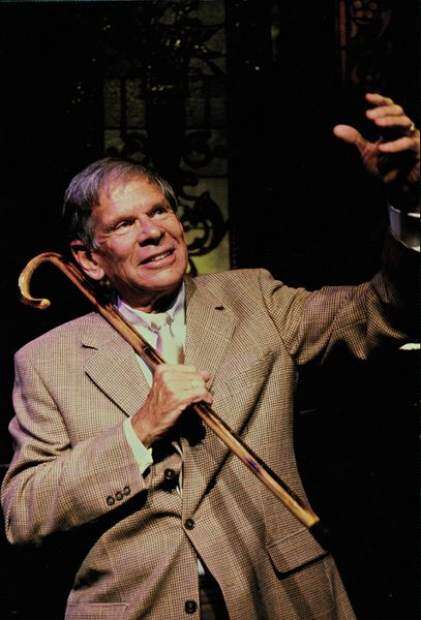Aspen loses iconic Aspen Hall of Famer
Frank Mead Metcalf, creator of famed Crystal Palace Theatre, dies at 93

Frank Mead Metcalf/Courtesy photo
Frank Mead Metcalf, who founded and ran Aspen’s legendary Crystal Palace Theatre for 51 years, died peacefully at his residence in Sedona, Arizona, on Friday. He was 93.
Metcalf, a longtime Aspen resident, entrepreneur, and performer, might be best remembered for the people he brought together while running the Crystal Palace Theatre from 1957 to 2008, according to his longtime friend and general manager of 23 years Nina Gabianelli.
“His biggest legacy, in my opinion, is the people that he brought together in Aspen, who really shape and create the working class of Aspen,” Gabianelli said, adding, “You could throw a rock and hit somebody who worked in the Crystal Palace in Aspen.”
Born in St. Louis, Missouri, on April 18, 1932, Metcalf began playing piano “by ear” at age 4, according to an obituary written by Gabianelli. After graduating in 1954 from Dartmouth College, where he was president of the glee club, he worked as a clerk and typist in the army. He was sent to Germany in 1955, where his superiors discovered he could play music, and transferred him to Berchtesgaden, Germany, to play for enlisted men over the course of nearly two years.
Metcalf moved to Aspen in 1957 following his service, where he spent a season playing piano at Hotel Jerome. He soon ventured out to start his own theater, opening the Crystal Palace Theatre on July 1, 1957, in what is now known as the Mother Lode Building in Aspen. In 1960, he purchased and renovated the building on the corner of Hyman and Monarch for $28,000 (a little over $300,000 in today’s dollars), which became the long-term home of Crystal Palace.
The theatre specialized in Broadway show tunes, patter, and opera — with some satire — through the 1960s.
“Live entertainment was very much a part of Aspen’s growth back then,” Gabianelli said, adding that the venue would see about 300 patrons over the course of its three nightly shows during the busy season.
Metcalf began training ski bums and staff who ran the venue’s restaurant to double as performers, “and the model for all future Crystal Palace shows was set,” the obituary states.
Sunrise Rundown: Headlines. Breaking News. Local Updates.
What’s happening in Aspen, in one click.
Sign up for the Sunrise Rundown at AspenTimes.com/newsletter
He married Joan Higbie in 1962, a performer at the theater who became known as “The Queen” of the Crystal Palace.
In the 1970s, the culture of the venue changed with the times, shifting in the wake of national protests and conflicts.
“The show itself morphed from show tunes into more political and social satire,” Gabianelli said. “In the end, I kind of described the show as ‘Saturday Night Live’ set to music.”
She added the satire wasn’t like today, “where people are making fun of each other and calling each other names,” but made fun of the whole political spectrum.
“It was satire, and it was humorous,” she said. “And we laughed at each other.”
Metcalf continued the satire at the venue into the 1980s, “joking with and making fun of” the increased money filtering into town as second-homeowners proliferated.
“And a lot of those people were coming to the Crystal Palace, too. Generations of Kennedys came to the Crystal Palace. And it becomes so successful by the late ’80s, or mid ’80s, Mead actually bought the building next door and opened up a second venue, which was called the Grande Finale,” Gabianelli said.
Metcalf hired talented performers for the new venue, which reviewed various composers, and focused less on satire.
In the 1990s, he hired a strong pool of performers for the Crystal, many of whom Gabianelli said stayed in Aspen long-term.
“They built their families and built their careers here in Aspen,” she said.
Over the 51 years the venue was opened, she estimated Metcalf employed more than 300 individuals, some of whom went on to perform on Broadway. He bought real estate to provide employee housing for his staff long before it became expected for employers to do so.
“It was the job to have,” she said of working for Metcalf. “The best job in town.”
More than 2 million people attended Crystal Palace performances over its five-decade operation, she estimated.
Metcalf himself played the piano “basically every night” at the theatre, most well-known for a song called “The Peanut Butter Affair,” which was about an executive who goes to work with peanut butter accidentally stuck to his chin.
“But because he’s the executive, people don’t question it,” Gabianelli said. “They mimic it.”
After his passing, Facebook comments abounded with personal memories of Metcalf performing “The Peanut Butter Affair.”
In 2005, Metcalf married his last wife, Diane Kelly Laughlin, a former Crystal Palace performer.

“‘What I Did for Love’ was Mead Metcalf’s mantra for his passion for music and motivated him to create the Crystal Palace in the mountain town of Aspen in 1957,” wrote Diane in Metcalf’s obituary. “A historic legacy rich with memories of laughter, music, merriment, drama, beauty, deep lasting friendships, marriages, divorces, and everlasting love.”
Metcalf was inducted into the Aspen Hall of Fame in 2009, following the 2008 closure of the theatre, for his profound impact on the Aspen community, according to Gabianelli.
He continued to play the piano until a month ago, at 93 and a half years old, she said.
As a person, she described Metcalf as “larger than life.”
She added, “He walked into a room, and the space became his. He commanded attention. And he was extraordinary at what he did.”
Metcalf’s celebration of life will be held at the Wheeler Opera House on April 18, 2026. Organizers ask those wishing to bring flowers to instead donate to Aspen Music Festival and School, Aspen Historical Society, or the Aspen Community Theatre.
Skyler Stark-Ragsdale can be reached at 970-429-9152 or email him at sstark-ragsdale@aspentimes.com.
Aspen Council amends short-term rental regulations
At a Nov. 18 Aspen City Council meeting, councilors voted to amend their policy on short-term rentals, or STRs, which are rentals that last less than 30 days.
Pitkin County emergency dispatch director sees national recognition
A high performing 911 center and positive workplace culture don’t have to be mutually exclusive. That’s the philosophy proven by the director of Pitkin County Regional Emergency Dispatch Center, Brett Loeb, who was just recognized nationally as the 2025 Public Safety Answering Point Finest Director of the Year by NiCE Public Safety — an organization that recognizes emergency communications excellence.










